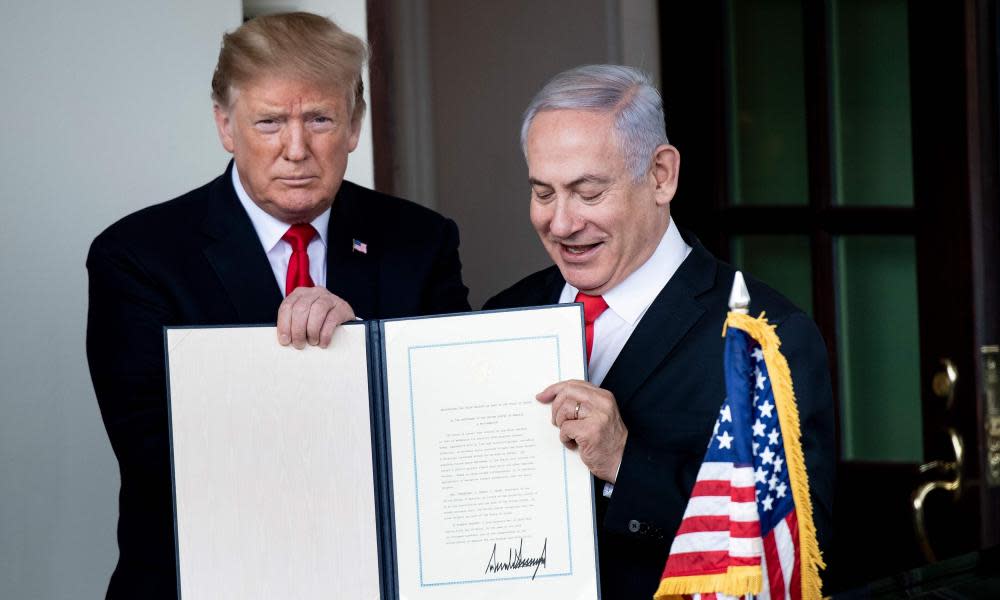Trump to meet Israeli leaders as doubts over ‘peace plan’ grow

Donald Trump is set to disclose details of his much-delayed Middle East “peace plan” during meetings with Israeli leaders in Washington on Monday, amid a rising global chorus of doubt about its timing and substance.
The choreography between the US and Israel has been interpreted as a convenient distraction for both Trump, who faces an impeachment trial, and Israel’s prime minister, Benjamin Netanyahu, who faces three criminal corruption indictments and an uncertain election campaign.
The Palestinian prime minister called on Monday for world powers to boycott the initiative. “This is a plan to protect Trump from impeachment and protect Netanyahu from prison. It is not a Middle East peace plan,” Mohammed Shtayyeh told a cabinet meeting.
Netanyahu has sought to play up his cosy relationship with Trump domestically and to promote himself as uniquely able to extract concessions from the US.
Before taking off for Washington, he said he hoped to “make history”.
On Monday, Trump will meet both Netanyahu and his election opponent Benny Gantz in the Oval Office for talks. Washington invited the opposition leader to make sure whoever becomes Israel’s next leader after the 2 March election will be onboard in advance.
On Tuesday, Trump will again host Netanyahu for talks and a press conference in what is expected to be the official rolling out of the plan, although it is not clear if a document will be publicly released. The attention-grabbing event is sure to overshadow a planned discussion on the same day in Israel’s parliament about Netanyahu’s indictments.
Few political aspects of the proposal have been disclosed, apart from an economic conference last summer that sought to raise money from Gulf countries to fund it. The plan was drafted by Trump’s son-in-law, Jared Kushner, with input from the US ambassador to Israel, David Friedman, a vocal supporter of Israeli settlements in the occupied Palestinian territories.
The Guardian understands that unlike previous attempts that have focused on getting Israeli and Palestinians leaders to find common ground, Washington’s new plan is dozens of pages long and has been drafted as a set of detailed suggestions.
Israeli media, citing unnamed Israeli officials, have reported that the measures would be extremely favourable to the country, allowing it to annex much of the Palestinian territories, including Jewish settlements, and all of contested Jerusalem. The Palestinians may be granted some form of self-rule but under tight restrictions.
Trump has said he expects Palestinian leaders to “act negatively at first” when his plan is revealed. His administration has promoted itself – especially to a large section of US evangelical voters who ardently back the Jewish state – as the most pro-Israel in the country’s history. Washington has already implemented a number of historic changes in the region.
It reversed decades of its policy by refraining from endorsing the internationally backed two-state solution. It has also recognised Jerusalem as Israel’s capital, cut millions of dollars in aid to Palestinians, and announced that it no longer views Israeli settlements in occupied territory as “inconsistent with international law”.
The Palestinian president, Mahmoud Abbas, said last week that the Palestinian leadership had a “clear and unwavering position” to reject any Trump-led initiatives. Palestinians fear the plan is an attempt to bully or bribe them to relinquish long-held demands for a state and a resolution for Palestinian refugees. They anticipate the plan could be implemented by the US and Israel whether they agree to it or not.
Saeb Erekat, the secretary general of the Palestine Liberation Organisation, referred to it as a “hoax and fraud”.
The leader of Hamas, the militant group that is in power in the Gaza Strip, also warned that Trump’s plan would not pass, and could lead to violence.
This “new plot aimed against Palestine is bound to fail” and could push the Palestinians to a “new phase in their struggle” against Israel, Ismail Haniyeh said.

 Yahoo News
Yahoo News 
